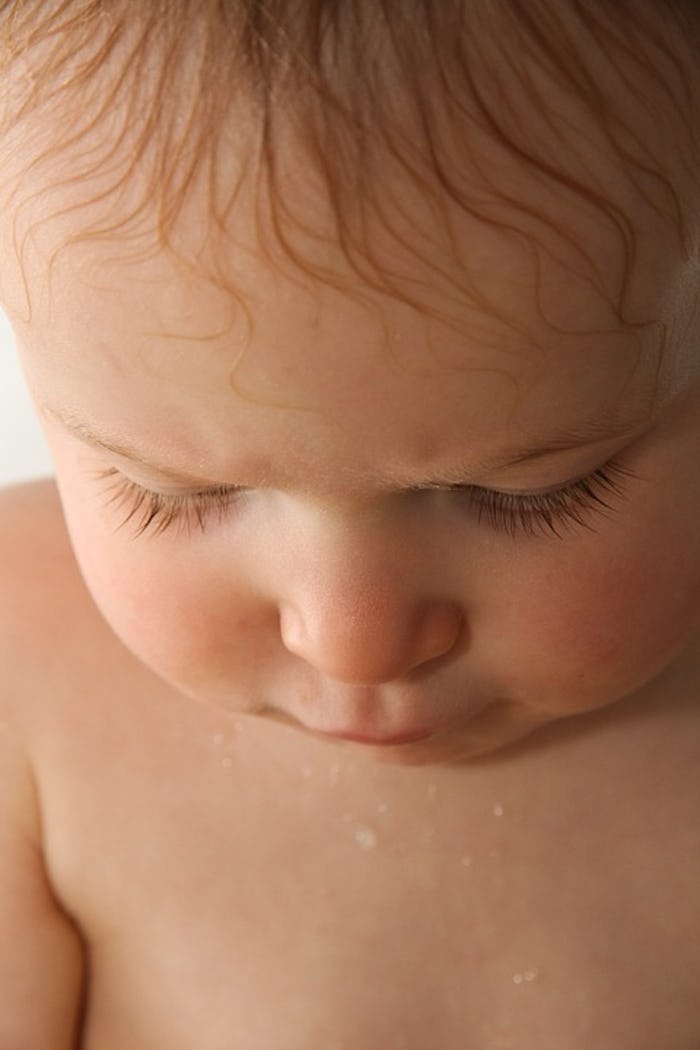The thought of anything hindering your baby's ability to breathe is terrifying to any parent, which is why many moms and dads are on the look out for signs your baby has asthma. And the concern is reasl, as asthma in kids (and babies) is on the rise, according to Parents. It has increased 160 percent since 1980, and according to the American Academy of Allergy Asthma and Immunology (AAAAI), one in 10 children have asthma— a number that, unfortunately, doesn't exclude babies.
Asthma is a chronic lung disease that "inflames and narrows the airways," according to the National Heart, Blood, and Lung Institute (NHBLI.) Although it affects many adults, the symptoms can start showing up at a very young age, even in infancy. Unfortunately, the NHBLI stated that asthma has no cure, and even if you feel like you have the disease under control, your child will probably still struggle with it for years.
Luckily, being on the lookout for signs of asthma and knowing the factors that will put your baby at a higher risk will help you be prepared should your baby start to experience symptoms. Although asthma isn't fun for any parent to think about, being aware of the signs is the first step in helping your child.
1Your Baby Is Frequently Wheezing Or Coughing
Since there are multiple reasons your baby may be wheezing or coughing — such as a cold, obstructed airways, bronchitis, or RSV — according to Kids Health, the wheezing must be recurring to merit an asthma diagnosis. Babies already have very narrow airways, so the constricting that happens during an asthma attack makes it very difficult for them to breathe.
2Your Family Has A History Of Asthma
According to one study in the US National Library of Medicine, asthma tends to run in families, but the extend and likelihood of passing it on to your children isn't known fully. If you or a family member has a history of asthma, there's a chance your baby could too.
3Your Baby Has Eczema Or Other Allergies
The Asthma and Allergies Foundation of America noted that babies who have other allergies or have a personal history of eczema are more likely to develop asthma or have recurring wheezing episodes.
4Your Baby's Symptoms Worsen At Night
Although many children suffer from activity induced asthma, in babies, asthma is likely to be worse at night, according to Baby Center. If your baby has trouble breathing at night or has recurring wheezing episodes, they may be diagnosed with asthma upon visiting the doctor.
5Your Baby Had A Low Birth Weight
Although the evidence isn't conclusive, many studies, like this one published in BMC Pediatrics, noted that a low birth weight or premature birth may be correlated with respiratory issues later in life. Although researchers aren't sure if asthma is included in those respiratory issues, according to MedPage, it's worth the extra effort to be cautious.
6Your Baby Has Been Exposed To Cigarette Smoke
Americans for Nonsmoker's Rights quoted the 2006 Surgeon General's report which stated that there is no safe level of cigarette smoke exposure in children. It puts them at higher risk for asthma, SIDS, respiratory problems, among others. They stated that secondhand smoke exposure increases the frequency of asthmatic episodes, the severity of the symptoms, and that maternal smoking while pregnant greatly increases the child's risk of developing asthma.
